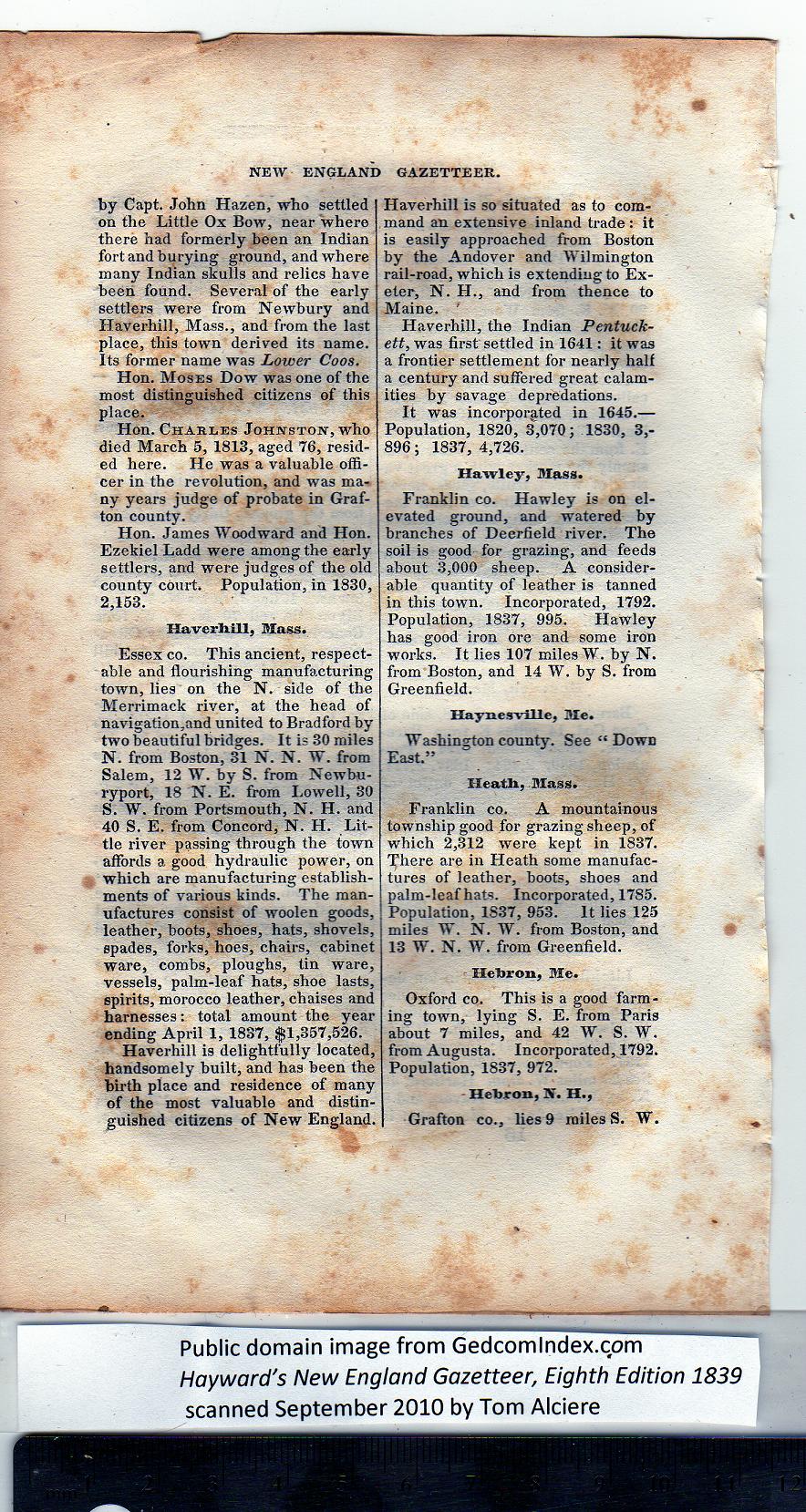|
by Capt. John Hazen, who settled
on the Little Ox Bow, near where
there had formerly been an Indian
fort and burying ground, and where
many Indian skulls and relics have
been found. Several of the early
settlers were from Newbury and
Haverhill, Mass., and from the last
place, this town derived its name.
Its former name was Lower Coos.
Hon. Moses Dow was one of the
most distinguished citizens of this
place.
Hon. Charles Johnston, who
died March 5, 1813, aged 76, resid-
ed here. He was a valuable offi-
cer in the revolution, and was ma-
ny years judge of probate in Graf-
ton county.
Hon. James Woodward and Hon.
Ezekiel Ladd were among the early
settlers, and were judges of the old
countv court. Population, in 1830,
2,153.
Haverhill, Mass.
Essex co. This ancient, respect-
able and flourishing manufacturing
town, lies on the N. side of the
Merrimack river, at the head of
navigation,and united to Bradford by
two beautiful bridges. It is 30 miles
N. from Boston, 31 N. N. W. from
Salem, 12 W. by S. from Newbu-
ryport, 18 N. E. from Lowell, 30
S. W. from Portsmouth, N. H. and
40 S. E. from Concord, N. H. Lit-
tle river passing through the town
affords a good hydraulic power, on
which are manufacturing establish-
ments of various kinds. The man-
ufactures consist of woolen goods,
leather, boots, shoes, hats, shovels,
spades, forks, hoes, chairs, cabinet
ware, combs, ploughs, tin ware,
vessels, palm-leaf hats, shoe lasts,
spirits, morocco leather, chaises and
harnesses: total amount the year
ending April 1, 1837, $1,357,526.
Haverhill is delightfully located,
handsomely built, and has been the
birth place and residence of many
of the most valuable and distin-
guished citizens of New England. |
Haverhill is so situated as to com-
mand an extensive inland trade: it
is easily approached from Boston
by the Andover and Wilmington
rail-road, which is extending to Ex-
eter, N. H., and from thence to
Maine. '
Haverhill, the Indian Pentuck-
ett, was first settled in 1641: it was
a frontier settlement for nearly half
a century and suffered great calam-
ities by savage depredations.
It was incorporated in 1645.—
Population, 1820, 3,070; 1830, 3,-
896; 1837, 4,726.
Hawley, Mass.
Franklin co. Hawley is on el-
evated ground, and watered by
branches of Deerfield river. The
soil is good for grazing, and feeds
about 3,000 sheep. A consider-
able quantity of leather is tanned
in this town. Incorporated, 1792.
Population, 1837, 995. Hawley
has good iron ore and some iron
works. It lies 107 miles W. by N.
from Boston, and 14 W. hy S. from
Greenfield.
Haynesville, Me.
Washington county. See “ Down
East.”
Heatli, Mass.
Franklin co. A mountainous
township good for grazing sheep, of
which 2,312 were kept in 1837.
There are in Heath some manufac-
tures of leather, boots, shoes and
palm-leaf hats. Incorporated, 17S5.
Population, 1837, 953. It lies 125
miles W. N. W. from Boston, and
IB W. N. W. from Greenfield.
Hebron, Me.
Oxford co. This is a good farm-
ing town, lying S. E. from Paris
about 7 miles, and 42 W. S. W.
from Augusta. Incorporated, 1792.
Population, 1837, 972.
Hebron, IV. H.,
Grafton co., lies 9 miles S. W. |
